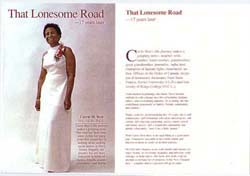 Carrie Best planned, but never released, an updated version of her 1977 autobiography That Lonesome Road. A book jacket and foreword were produced, but the book, to be called That Lonesome Road -- 17 years later, was never finished. Here is that
foreword
by Nova Scotia born Princeton professor Peter Paris. INTRODUCTION No person of African descent in the province of Nova Scotia has achieved higher public esteem than Dr. Carrie M. Best. Born over nine decades ago into a family of modest means, she remembers well her mother's teaching that she would need to find the path to her own destiny. Accordingly, her mother gave her one clue: "Take the first turn right and go straight ahead." By following that teaching all her life, Dr. Best strives in this book to pass on to yet another generation a portion of the knowledge and wisdom she has gained over the expanse of her long life. When the first edition of this autobiography was written, Dr. best was then in her seventh decade of life. Having been blest with good health and an excellent memory, it is right and fitting that she should update this book not only because she is presently in her early nineties, but because, throughout the past two decades, she has been as active as ever. This fact is evidenced by her various civic activities throughout the province and the steady flow of honors that continue to be awarded her. Recently, I had the good pleasure of visiting with Dr. Best at her home and after two hours of conversation, I was amazed by her tireless engagement with a variety of public issues. Having known her all my life, her characteristic courage, zeal and loquacity show no signs of diminution.
Rather, her clear-headed, articulate, single-minded, dedicated quest for racial justice continues to characterize both her personal life and her public commitments. Rigorously autonomous in all things, she readily admits without apology having been compelled "to follow the beat of a different drum and for the greater part of the journey to travel alone." Even though "That Lonesome Road" was not always understood by all who knew her, yet, with respect to all matters concerning racial justice, Dr. Best has always enjoyed the universal praise of all of our people for her audacious spirit, eloquent speech and uncompromising resolve. At a time when few blacks in Nova Scotia were willing to engage in protest activities, Dr. Best fearlessly made her writing and speaking serve the ends of racial justice for all peoples. Thus, this woman had no difficulty welcoming the dawn of the nascent black consciousness revolution of the 1960's because her life's work had long
exhibited the basic principles of that movement, namely, racial self-respect, human dignity, freedom, equality,
self-determination, to mention only a few. Dr. Best's characteristic independence is clearly seen in the various avenues she created as institutionalized means for expressing her concerns about human rights. These included her
one page newspaper, The Clarion (the first black newspaper in the province); her twelve-year weekly radio program, The Quiet Corner; her seven-year weekly column in the Pictou Advocate; her countless speeches, letters and papers. Dr. Best used each of those arenas as a free space in which her voice soon became synonymous with her message. In this book, the reader Peter J. Paris, B.A., B.D., M.A., Ph.D., D.D. |